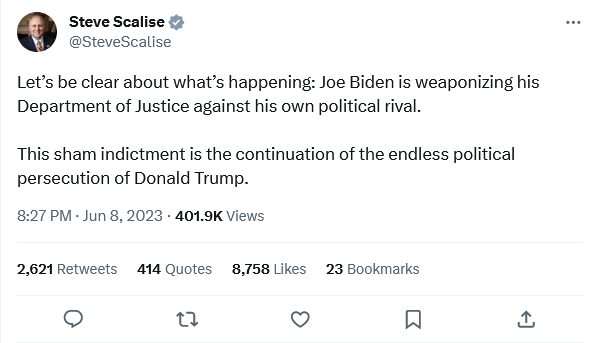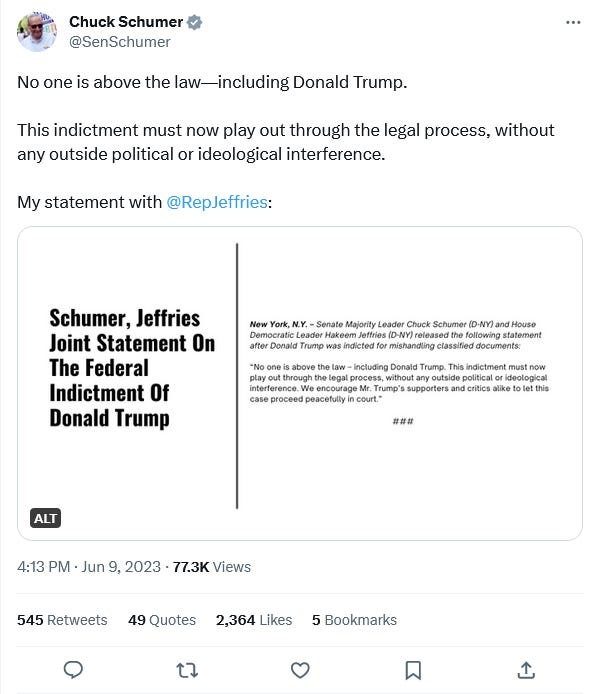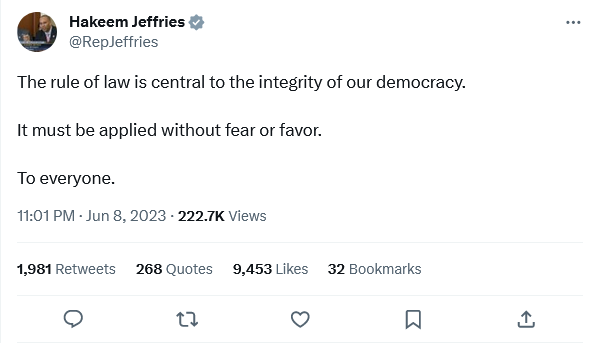The Trump Circus Moves To The Federal Tent
No Matter The Facts, Politics Have Already Tainted The Case
And just like that, Manhattan District Attorney Alvin Bragg, the man with the stones to indict a former US President, became a sideshow.
By Tuesday, June 13, Donald Trump, former President and candidate in the upcoming 2024 Presidential contest, will be formally indicted by the US Department of Justice on charges of mishandling classified documents upon leaving office.
The Justice Department on Thursday took the legally and politically momentous step of lodging federal criminal charges against former President Donald J. Trump, accusing him of mishandling classified documents he kept upon leaving office and then obstructing the government’s efforts to reclaim them.
Mr. Trump confirmed on his social media platform that he had been indicted. The charges against him include willfully retaining national defense secrets in violation of the Espionage Act, making false statements and a conspiracy to obstruct justice, according to two people familiar with the matter.
The Justice Department made no comment on the indictment Thursday and did not immediately make the document public.
Late yesterday afternoon, the Justice Department finally unsealed the indictment, detailing some 37 counts against the former President.
Good afternoon. Today, an indictment was unsealed charging Donald J. Trump with felony violations of our national security laws as well as participating in a conspiracy to obstruct justice.
This indictment was voted by a grand jury of citizens in the Southern District of Florida, and I invite everyone to read it in full to understand the scope and the gravity of the crimes charged.
The indictment is available online here.
Upon being summoned to appear at the Federal Courthouse in Miami on Tuesday, June 13, at 3PM, Donald Trump lost no time in taking to social media to present his case to the people (and, in particular, his followers).
As might be expected, responses to Trump’s announcement of the indictment fell along partisan lines.
Speaker of the House Kevin McCarthy voice his unequivocal support for Donald Trump:
So, too, did Congressman Steve Scalise:
From the GOP’s Senatorial ranks, Ted Cruz called the indictment a disgrace.
Among Democrats, President Biden’s handlers showed uncharacteristic restraint and have not tweeted about the indictment as of this writing.
Senate Majority Leader Chuck Schumer initially remained quiet, then issued a rather formulaic statement about no one being above the law.
Of course, the case has already proceeded along political and ideological lines, which makes Schumer’s tweet somewhere between disingneuous and delusional.
House Minority Leader Hakeem Jeffries issued a fairly anodyne tweet about the rule of law.
Left-leaning libertarian commentator Tim Pool called the indictment “cheating”.
Independent journalist Benny Johnson highlighted a statement by sports commentator Stephen A. Smith: “They can’t beat him legitimately!”
Thus even before the indictment was unsealed, the case against Donald Trump was moving along predictable partisan lines—which does not augur well for the “rule of law” so esteemed by Congressman Jeffries. Among Republicans and even independents, the sentiment is forming that this indictment is motivated primarily by politics and not out of any respect for the rule of law.
Even before the indictment was made public, the corporate media had nevertheless reported (via its usual “leaks” and “anonymous sources”) that the indictment centers on violations of the WW1-era Espionage Act of 19171, the provisions of which are found in Title 18, Chapter 37, of the US Code2.
Specifically, what what reported by the corporate media is that Trump would be indicted under Section 793 of the Espionage Act3.
The Independent has learned that prosecutors are ready to ask grand jurors to approve an indictment against Mr Trump for violating a portion of the US criminal code known as Section 793, which prohibits “gathering, transmitting or losing” any “information respecting the national defence”.
The use of Section 793, which does not make reference to classified information, is understood to be a strategic decision by prosecutors that has been made to short-circuit Mr Trump’s ability to claim that he used his authority as president to declassify documents he removed from the White House and kept at his Palm Beach, Florida property long after his term expired on 20 January 2021.
Unsurprisingly, the anonymous sources leaked the correct information to the media—Trump indeed has been indicted principally under §793. Somewhat surprisingly, however, the Espionage Act charges did not fall under subsection (f):
Whoever, being entrusted with or having lawful possession or control of any document, writing, code book, signal book, sketch, photograph, photographic negative, blueprint, plan, map, model, instrument, appliance, note, or information, relating to the national defense, (1) through gross negligence permits the same to be removed from its proper place of custody or delivered to anyone in violation of his trust, or to be lost, stolen, abstracted, or destroyed, or (2) having knowledge that the same has been illegally removed from its proper place of custody or delivered to anyone in violation of its trust, or lost, or stolen, abstracted, or destroyed, and fails to make prompt report of such loss, theft, abstraction, or destruction to his superior officer—
Shall be fined under this title or imprisoned not more than ten years, or both.
Subsection (f) only requires a finding of “gross negligence”4:
Gross negligence is a lack of care that demonstrates reckless disregard for the safety or lives of others, which is so great it appears to be a conscious violation of other people's rights to safety. Gross negligence is a heightened degree of negligence representing an extreme departure from the ordinary standard of care. Falling between intent to do wrongful harm and ordinary negligence, gross negligence is defined as willful, wanton, and reckless conduct affecting the life or property or another.
Rather, Trump has been charged under subsection (e):
Whoever having unauthorized possession of, access to, or control over any document, writing, code book, signal book, sketch, photograph, photographic negative, blueprint, plan, map, model, instrument, appliance, or note relating to the national defense, or information relating to the national defense which information the possessor has reason to believe could be used to the injury of the United States or to the advantage of any foreign nation, willfully communicates, delivers, transmits or causes to be communicated, delivered, or transmitted, or attempts to communicate, deliver, transmit or cause to be communicated, delivered, or transmitted the same to any person not entitled to receive it, or willfully retains the same and fails to deliver it to the officer or employee of the United States entitled to receive it
Specifically, Trump has been charged with 31 counts of “Willful Retention of National Defense Information”. Each count can earn up to 10 years in prison upon conviction.
However, the indictment raises yet more questions about the potential political nature of the case.
After leaving the Vice Presidency, President Biden retained similar classified documents including intelligence memos and briefing documents.
Among the items from Joe Biden’s time as vice president discovered in a private office last fall are 10 classified documents including US intelligence memos and briefing materials that covered topics including Ukraine, Iran and the United Kingdom, according to a source familiar with the matter.
Moreover, some of the material was classified “sensitive compartmented information”, which can only be viewed in a specially designated “sensitive compartmented information facility” (“SCIF”).
Ironically, Biden had been quite critical of Trump over the handling of classified materials:Biden was critical of Trump when he saw the photograph taken by the FBI that showed an array of documents found on Trump’s property last summer.
“How that could possibly happen? How one – anyone could be that irresponsible?” Biden said. “And I thought what data was in there that may compromise sources and methods? By that I mean names of people who helped or, et cetera. … totally irresponsible.”
If we take the President at his word, his own malfeasance in this regard should be met with equal response.
The investigation into the handling of those documents is ongoing. However, given this indictment of Donald Trump, one has to wonder if the President should also not be indicted on substantially the same charges. Following Congressman Jeffries tweeted position that the law must be applied “without fear or favor”, such an indictment would be almost mandatory.Former Vice President Mike Pence was recently cleared by the FBI of any wrongdoing—at least, he will not be criminally charge with any wrongdoing—after having been found in possession of classified materials at his Indiana home.
The classified documents were discovered at Pence’s new home in Carmel, Indiana, by a lawyer for Pence in the wake of the revelations about classified material discovered in President Joe Biden’s private office and residence, the sources said. The discovery comes after Pence has repeatedly said he did not have any classified documents in his possession.
Moreover, Pence made numerous denials that he had retained any classified materials. He denied possessing classified materials in an ABC News interview on November 15, 2022:
In an interview with ABC News in his Indiana home where the classified documents would eventually be found, Pence is asked again if he took classified material from the White House. “I did not,” Pence responds.
In a CBS interview on January 10 of this year, Pence doubled down on that denial, stating he and his staff had reviewed “all” materials and found no classified documents.
In an interview with CBS, Pence reiterates that he and his staff had reviewed all “materials in our office and in our residence to ensure that there were no classified materials that – that left the White House or remained in our possession.”
Both denials, of course, were proven to be in error, and Pence’s “review” of the materials he’d retained after leaving office turned out to be somewhat less than thorough.
Did Pence merely overlook the classified documents during his “review” or did he make a false statement regarding his lack of possession of classified materials?
Did Pence’s denials make the retention “willful”—thus potentially indictable under §793(e)?
Of course, we cannot know the answers, but, under the circumstances, it is only natural to ask the questions.Given the breadth of material that can arguably be brought under the §793 umbrella, not indicting Pence while indicting Trump is difficult to square with the “without fear or favor” standard advocated by Hakeem Jeffries.
Nor can we forget Hillary Clinton’s own classified information imbroglio from 2016, where her personal email server was found to have contained multiple instances of illegally transmitted and stored classified materials, as was confirmed by then-FBI Director James Comey.
From the group of 30,000 e-mails returned to the State Department, 110 e-mails in 52 e-mail chains have been determined by the owning agency to contain classified information at the time they were sent or received. Eight of those chains contained information that was Top Secret at the time they were sent; 36 chains contained Secret information at the time; and eight contained Confidential information, which is the lowest level of classification. Separate from those, about 2,000 additional e-mails were “up-classified” to make them Confidential; the information in those had not been classified at the time the e-mails were sent.
Moreover, Comey’s assessment at the time was that Hillary Clinton and her staff were merely “extremely careless” in handling classified information.
Although we did not find clear evidence that Secretary Clinton or her colleagues intended to violate laws governing the handling of classified information, there is evidence that they were extremely careless in their handling of very sensitive, highly classified information.
Hillary Clinton’s “extreme carelessness” is particularly troubling in light of the pending Trump indictment, because an alternative term for “extreme carelessness” is “gross negligence”.
A grossly negligent handling of national defense information, remember, falls under §793(f).
As a Regent University Law Review article would later argue5, Hillary Clinton was liable for prosecution under the same Section 793 statute under which Donald Trump is now indicted.
The Department of Justice failed to pursue justice when it decided not to file charges against Hillary Clinton regarding her private e-mail server. Congress created a statute that encompasses the mishandling of classified information through both willful intent and gross negligence to hold government officials to the oath they swore, which is to protect our nation’s secrets. Hillary Clinton’s acts were precisely what Congress intended to curb, and the lack of charges reveals a hole in our justice system that must be filled.
Following that case for prosecuting Hillary Clinton, she should have been prosecuted under the same subsection as Donald Trump—§793(e)—as well as under §793(f), which is the section which only requires a proof of gross negligence.
If, as many have tweeted, that “no one is above the law”—if, as Hakeem Jeffries has advocated, the law is to be applied “without fear or favor”—there is indeed a very large question of legitimacy in the indictment of Donald Trump. When two former Vice Presidents—one of whom is now the President of the United States—and a former Secretary of State are shown to illegally have classified material in their possession—material that almost certainly pertains to “the national defense”—in almost the exact same manner as Donald Trump yet are not brought up on charges, on what basis then is Trump to be charged?
James Comey’s argument at the time of the Clinton scandal was that such would not have been a “reasonable” prosecution:
Although there is evidence of potential violations of the statutes regarding the handling of classified information, our judgment is that no reasonable prosecutor would bring such a case. Prosecutors necessarily weigh a number of factors before bringing charges. There are obvious considerations, like the strength of the evidence, especially regarding intent. Responsible decisions also consider the context of a person’s actions, and how similar situations have been handled in the past.
In looking back at our investigations into mishandling or removal of classified information, we cannot find a case that would support bringing criminal charges on these facts. All the cases prosecuted involved some combination of: clearly intentional and willful mishandling of classified information; or vast quantities of materials exposed in such a way as to support an inference of intentional misconduct; or indications of disloyalty to the United States; or efforts to obstruct justice. We do not see those things here.
Upon what basis, then, is it “reasonable” to indict Donald Trump, while at the same time not indicting either Pence or Biden—particularly since Biden’s retention of classified materials included materials that were “Sensitive Compartmented Information” on par with the level of material Trump is accused of retaining? How is it “reasonable” to indict Donald Trump when it was not “reasonable” to indict Hillary Clinton? Demonstrably, the conduct of all four individuals would appear to be indictable under the exact same statute.
In one regard, Hakeem Jeffries is correct. The law should be applied without fear or favor. That is the only way one can establish the standard that no one is above the law.
Certainly the materials described in the indictement sound as if they are juicy national defense secrets. If we take the indictment’s statement of facts at face value, there are legitimate potential offenses for which Trump must answer. Whether the evidence suffices to establish guilt is not something about which anyone should speculate—that is for a jury to resolve, and we must leave it in their hands (for that is “the rule of law”).
However, the same can be said of the materials Biden illegally retained after leaving the Vice Presidency, of the materials Pence illegally retained after leaving the Vice Presidency, and of the materials Hillary Clinton illegally transmitted from her personal email server while Secretary of State. If we take the classification markings on the materials in question in all four cases at face value, we are faced with the very real and very unjust possibility that all four are equally guilty of the same offense—yet only one has been charged with that offense: Donald Trump.
While no one should ever be above the law, neither should anyone be left below the law. Given the exonerations of Pence and Clinton, and the current inaction against Biden, below the law appears to be exactly where Donald Trump has been left.
Barring clear and unequivocal evidence to the contrary, the law is being applied to Donald Trump with both fear and favor—and that is an injustice to us all.
United States Congress. Public Law 65-24, “Espionage Act of 1917”. GovTrack.US, 1917, 40 Stat 217. https://govtrackus.s3.amazonaws.com/legislink/pdf/stat/40/STATUTE-40-Pg217.pdf.
Wex Definitions Team, Legal Information Institute. “Gross Negligence”, Wex. Jan. 2022, https://www.law.cornell.edu/wex/gross_negligence.
Fields, Shannon, Intent or Gross Negligence: Hillary Clinton Should Be Charged Under 18 U.S.C. § 793 for Mishandling Classified Information (January 19, 2018). Regent University Law Review, Vol. 30, No. 1, 2017-2018, Available at SSRN: https://ssrn.com/abstract=3123775













Actually, what all this is, is investigation tampering. By indicting Trump's valet the Biden DOJ is warning congress what could happen to them if they continue to investigate the criminal dealings of the illegally inserted president.
Mr. Kust, this is the most fair and sensible post I have read on the issue. Thank you!